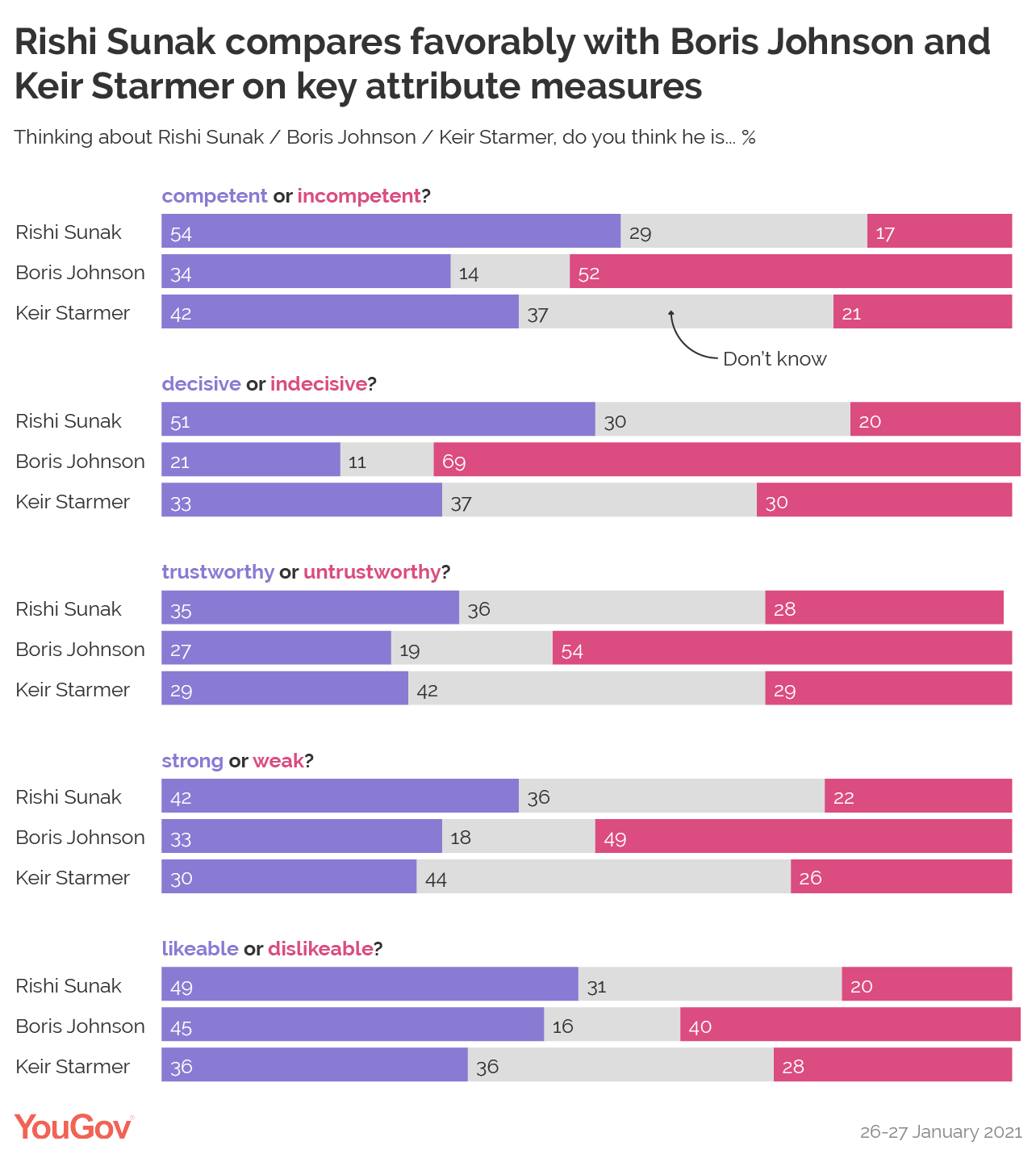Despite a drop in his overall approval, the chancellor remains popular with the public with ratings way above his cabinet colleagues
Rishi Sunak entered front-bench politics with a bang. Conducting his first budget just 27 days after being promoted to chancellor, and soon after finding himself front and centre of one of the biggest welfare schemes the country has seen in response to COVID.
Now, after just over a year in the job, the chancellor remains popular with the public, with 47% saying they have a positive view of Rishi Sunak, compared to 34% who do not, giving him a net score of +13. He is also viewed positively when it comes to the job he is doing as chancellor, with the public backing him in the role by 41% to 21%, giving a net score of +20. This score is better than any of his four predecessors have ever achieved since the Conservatives entered government in 2010.
He is also by far the most popular politician in frontline politics, outperforming both Boris Johnson (net score -12), and Keir Starmer (-10), as well as other cabinet ministers such as Dominc Raab (-19) and Matt Hancock (-23) on favourability ratings. When it comes to the COVID pandemic specifically the public also have more confidence in Sunak (45% confident vs 36% not confident) than Boris Johnson (37% to 56%) or health secretary Matt Hancock (30% to 54%).
However, Sunak has still experienced a sizeable decline from what were extraordinary favourability ratings back in spring 2020. At his peak in March, 60% of the public thought of him favourably, with just 9% saying they had an unfavourable opinion of the chancellor (a net score of +51).
Much of this fall in approval has come from 2019 Labour voters. In spring 2020 we saw that there was a generally “rallying to the flag” bounce for the government, and Sunak was a key beneficiary of this. As the pandemic has developed and government performance has been viewed less favourably, voters have moved back towards their party lines. Hence, the number of Labour voters backing Sunak has fallen from 50% in March to only 27% now. While this is fairly big, it should not be shrugged off that just over a quarter of Labour voters still view a Conservative chancellor favourably.
Despite falling approval figures, Sunak is still sitting in a comfortable position as he prepares for his second Budget. His overall figures can partly be explained by how positively the public judge him across key characteristics. He is seen as competent (by 54% to 17% who disagree), decisive (51% to 20%), likable (49% to 20%) and strong (42% to 22%), and is more likely to be seen as trustworthy (35%) than not (28%). In fact, he even has a positive score for competence, decisiveness and likability amongst 2019 Labour voters, and performs better than the Prime Minister amongst the public on all five.

Part of the reason approval of Sunak has remained positive while that of his colleagues has fallen, could be that his pandemic policies have been viewed more positively than other areas.
Sunak’s most notable policy in his short time in the job has been the furlough scheme, which is currently viewed as a success by 56% of the public. Just 8% see it as a failure. Eat Out to Help Out – the other key policy people tend to associate with Sunak – on the other hand is no longer seen so positively, and may even have harmed his approval over autumn.
On reflection, just 26% see the scheme that ran in August 2020 as a success, 42% a failure, and 26% neither. Even these lukewarm figures, though, are far better than other ministers’ policies. The test and trace app, for example, is seen as a failure by 64% of the public with just 7% seeing it a success. While the handling of restrictions around Christmas time also viewed as a failure (by 63% to 10%).
The big test for Sunak is the inevitable need to fix the public finances once coronavirus is no longer a threat. If the chancellor’s success so far has been based on bankrolling very expensive employment support programmes, will he be able to sustain his public image when he was to start tightening the pursestrings?
The data from this article can be found in the following locations:






